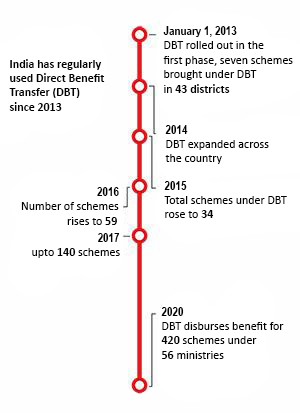Governance
DBT for Mid Day Meal Scheme
- 29 May 2021
- 4 min read
Why in News
The Ministry of Education has approved the proposal to provide monetary assistance to students through Direct Benefit Transfer (DBT) of the cooking cost component of the Mid-Day-Meal (MDM) Scheme, to all eligible children.
Key Points
- Implications of DBT for MDM Scheme:
- With schools closed for months due to Covid-19, this move will give a fillip to the Midday Meal programme.
- This is in addition to the Government of India’s announcement of distribution of free-of-cost food grains at Rs. 5/kg per person per month to nearly 80 crore beneficiaries under the Pradhan Mantri Garib Kalyan Anna Yojana (PM-GKAY).
- It will help safeguard the nutritional levels of children and aid in protecting their immunity during the challenging pandemic times.
- This one time special welfare measure will benefit about 11.8 crore children studying in class I to VIII in the 11.20 lakh Government and Government aided schools across the country.
- The central government will provide additional funds of about Rs. 1200 crore to state governments and UT administrations for this purpose.
- About Mid-Day-Meal Scheme:
- Launch: It is a centrally sponsored scheme which was launched in 1995.
- It is considered as the world’s largest school feeding programme aimed to attain the goal of universalization of primary education.
- Nodal Ministry: Ministry of Education.
- Aim: To address hunger and malnutrition, increase enrolment and attendance in school, improve socialisation among castes, provide employment at grassroot level especially to women.
- Provisions:
- Provides cooked meals to every child within the age group of six to fourteen years studying in classes I to VIII who enrolls and attends the school.
- Cooked meal having nutritional standards of 450 calories and 12 gm of protein for primary (I-V class) and 700 calories and 20 gm protein for upper primary (VI-VIII class).
- If the Mid-Day Meal is not provided in school on any school day due to non-availability of food grains or any other reason, the State Government shall pay food security allowance by 15th of the succeeding month.
- Beneficiaries: All children in government and aided schools and madrasas supported under Samagra Shiksha.
- Launch: It is a centrally sponsored scheme which was launched in 1995.
Direct Benefit Transfer Scheme
- Aim: It has been visioned as an aid for simpler/faster flow of information and funds to the beneficiaries and to reduce the fraud in the delivery system.
- Implementation: It is a mission or an initiative by the government of India started on 1st January 2013 as a way to reform the government delivery system.
- Central Plan Scheme Monitoring System (CPSMS), the earlier version of the Public Financial Management System (PFMS), of the Office of Controller General of Accounts, was chosen to act as the common platform for routing of the Direct Benefit Transfer.
- Components of DBT: Primary components in the implementation of DBT schemes include Beneficiary Account Validation System, a robust payment and reconciliation platform integrated with RBI, NPCI, Public & Private Sector Banks, Regional Rural Banks and Cooperative Banks (core banking solutions of banks, settlement systems of RBI, Aadhaar Payment Bridge of NPCI) etc.
- Other Schemes involving DBT:





